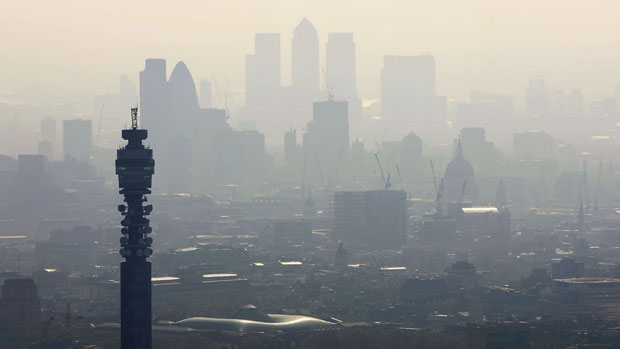Dirty air linked to increased dementia risk
Researchers say people in highly polluted areas are up to 40% more likely to develop the disorder

A free daily email with the biggest news stories of the day – and the best features from TheWeek.com
You are now subscribed
Your newsletter sign-up was successful
Regular exposure to air pollution may greatly increase the risk of developing dementia, new research shows.
The London-based study, published in the journal BMJ Open, found that people living in areas with high levels of nitrogen oxide and PM2.5 - microscopic particles generated by fossil fuels - in the air were more likely to develop the neurodegenerative condition.
The scientists used estimates of air and noise pollution levels across the English capital and correlated these with the health records of 131,000 patients registered at 75 general practices within the M25 in 2004. All the patients were aged between 50 and 79, and had not been diagnosed with dementia.
The Week
Escape your echo chamber. Get the facts behind the news, plus analysis from multiple perspectives.

Sign up for The Week's Free Newsletters
From our morning news briefing to a weekly Good News Newsletter, get the best of The Week delivered directly to your inbox.
From our morning news briefing to a weekly Good News Newsletter, get the best of The Week delivered directly to your inbox.
Their health was tracked for an average of seven years from 2005, during which a total of 2,181 of the patients - 1.7% - were diagnosed with dementia. Of this group, 39% had Alzheimer’s disease, while 29% had vascular dementia.
The researchers - from the University of London, Imperial College and King’s College London - said they cannot establish that air pollution was a direct cause of the dementia cases. However, the diagnoses “were found to be linked to ambient levels of nitrogen dioxide and PM2.5, based on estimates taken near the homes of patients in 2004”, says The Independent.
Those living in areas with the highest nitrogen dioxide levels had a 40% increased risk of being diagnosed with dementia compared with those living in areas with the lowest, the scientists found.
Study co-author Frank Kelly, a professor of environmental health at King’s College London, told The Guardian: “I believe that we now have sufficient knowledge to add air pollution to the list of risk factors for dementia.”
A free daily email with the biggest news stories of the day – and the best features from TheWeek.com
There are around 850,000 people with dementia in the UK, a figure that is expected to rise to a million by 2025.
Alzheimer’s Research UK told the London Evening Standard that the link between air pollution and dementia risk is a “growing area of research”, but said the results should be treated with caution.
The charity’s chief scientific officer, David Reynolds, said: “While the researchers tried to account for factors like wealth, heart disease and other potential explanations for differences in dementia rates across the capital, it is difficult to rule out other explanations for the findings.
“The diseases that cause dementia can begin in the brain up to 20 years before symptoms start to show. We don’t know where people in this study lived in the two decades before their dementia diagnosis, so we have to be cautious about how we interpret these results.”
-
 Local elections 2026: where are they and who is expected to win?
Local elections 2026: where are they and who is expected to win?The Explainer Labour is braced for heavy losses and U-turn on postponing some council elections hasn’t helped the party’s prospects
-
 6 of the world’s most accessible destinations
6 of the world’s most accessible destinationsThe Week Recommends Experience all of Berlin, Singapore and Sydney
-
 How the FCC’s ‘equal time’ rule works
How the FCC’s ‘equal time’ rule worksIn the Spotlight The law is at the heart of the Colbert-CBS conflict
-
 Lecanemab: the Alzheimer’s drug that could herald a cure
Lecanemab: the Alzheimer’s drug that could herald a cureSpeed Read Treatment slowed memory decline by 27% over 18 months but there are concerns over safety
-
 Home Office worker accused of spiking mistress’s drink with abortion drug
Home Office worker accused of spiking mistress’s drink with abortion drugSpeed Read Darren Burke had failed to convince his girlfriend to terminate pregnancy
-
 In hock to Moscow: exploring Germany’s woeful energy policy
In hock to Moscow: exploring Germany’s woeful energy policySpeed Read Don’t expect Berlin to wean itself off Russian gas any time soon
-
 Were Covid restrictions dropped too soon?
Were Covid restrictions dropped too soon?Speed Read ‘Living with Covid’ is already proving problematic – just look at the travel chaos this week
-
 Inclusive Britain: a new strategy for tackling racism in the UK
Inclusive Britain: a new strategy for tackling racism in the UKSpeed Read Government has revealed action plan setting out 74 steps that ministers will take
-
 Sandy Hook families vs. Remington: a small victory over the gunmakers
Sandy Hook families vs. Remington: a small victory over the gunmakersSpeed Read Last week the families settled a lawsuit for $73m against the manufacturer
-
 Farmers vs. walkers: the battle over ‘Britain’s green and pleasant land’
Farmers vs. walkers: the battle over ‘Britain’s green and pleasant land’Speed Read Updated Countryside Code tells farmers: ‘be nice, say hello, share the space’
-
 Motherhood: why are we putting it off?
Motherhood: why are we putting it off?Speed Read Stats show around 50% of women in England and Wales now don’t have children by 30